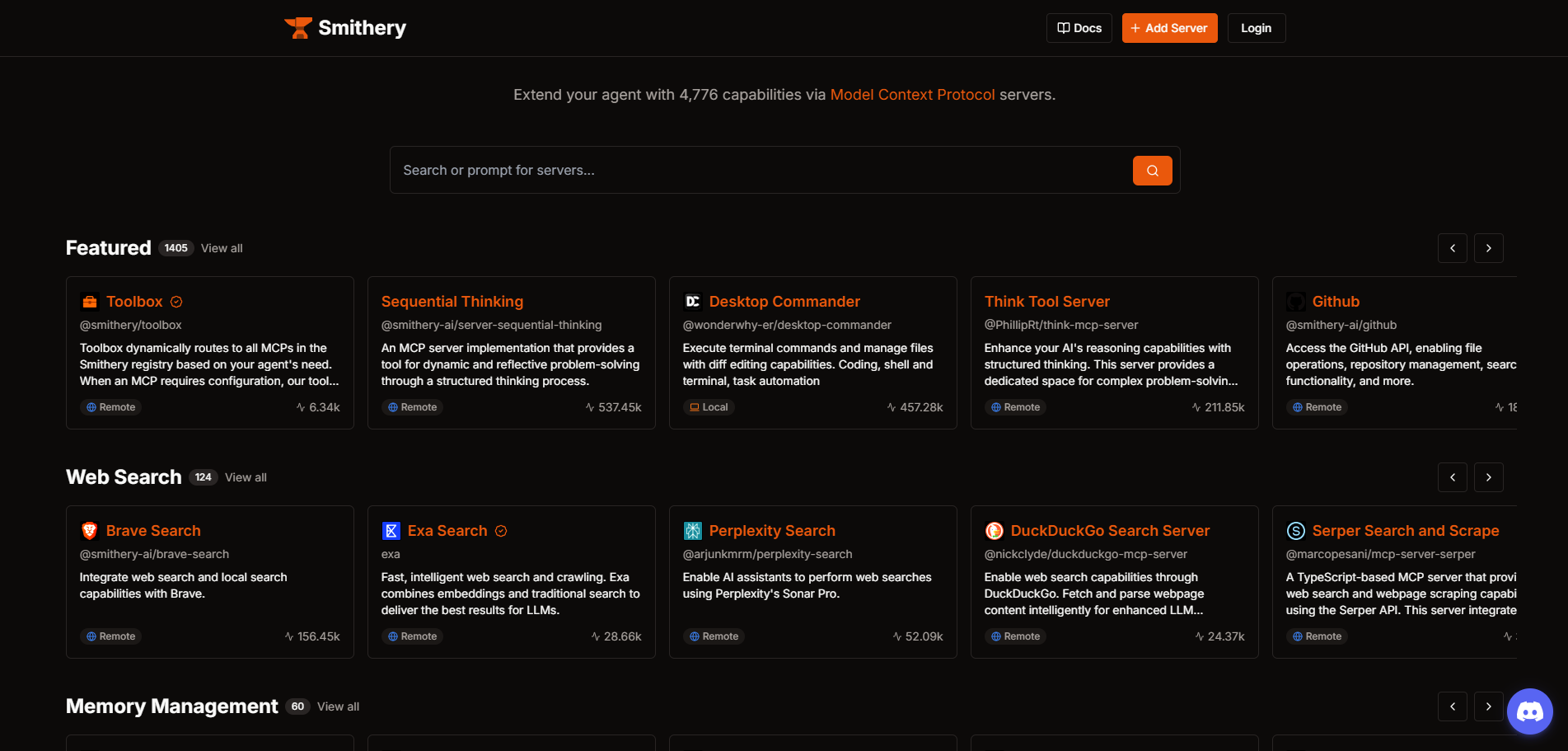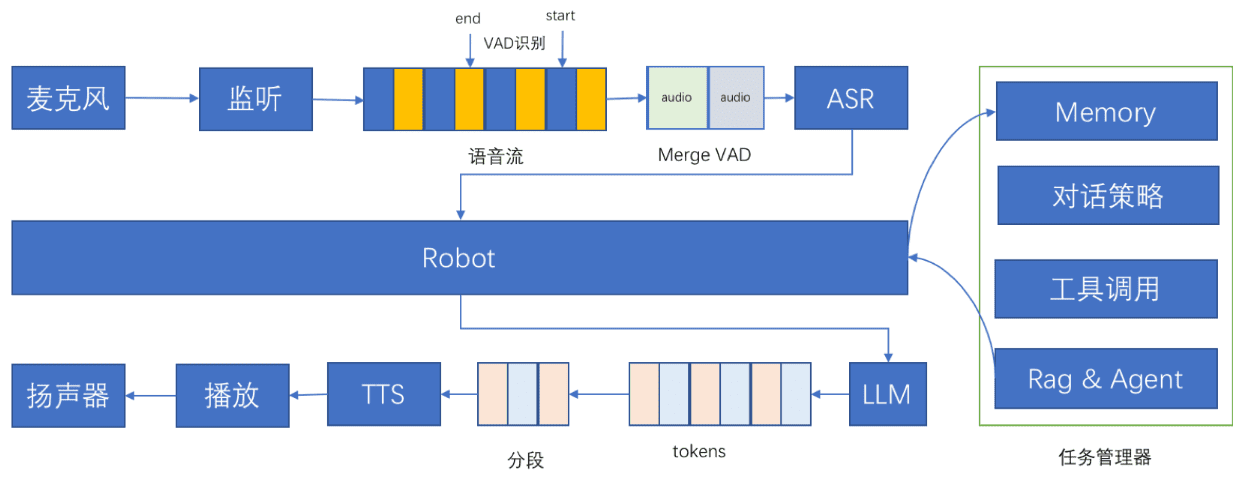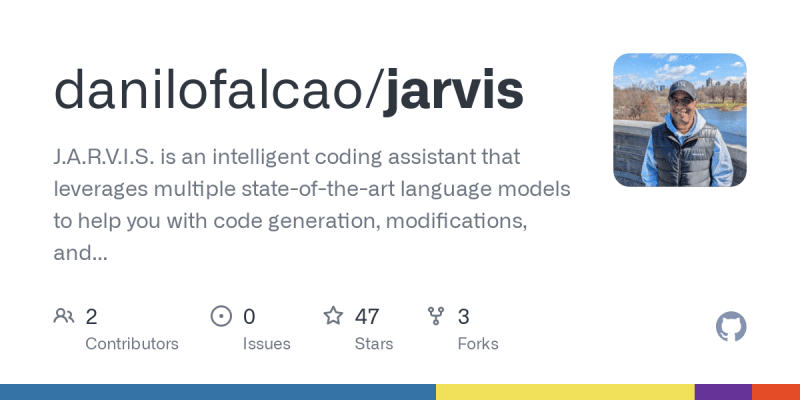Smithery: an MCP server registration platform that connects AI with tools
General Introduction
Smithery is a platform that helps developers discover, deploy, and manage Model Context Protocol (MCP) servers.MCP is an open protocol that allows large language models (LLMs) to connect seamlessly with external tools and data sources.Smithery provides a centralized registry of over 4,000 MCP servers, covering a wide range of functionality from web search to code automation. Developers can quickly integrate these servers with simple command-line tools or SDKs to extend the capabilities of their AI applications. With support for local and remote deployment and a focus on security and privacy, the platform is ideal for building intelligent code assistants, chat interfaces, or custom AI workflows.Smithery's goal is to simplify the integration of AI with tools and accelerate the development of agentic AI.

Function List
- MCP Server Registration and Discovery: More than 4,000 MCP servers are available, so developers can browse and choose the right tool for the job.
- Command Line Instruments (CLI): The command can be used with simple commands (e.g.
smithery install) Install and configure the MCP server. - SDK Support: TypeScript and Python SDKs are available to simplify integration with language models.
- Local and Remote Deployment: Support for running servers locally or hosting through Smithery's cloud infrastructure.
- security management: Ensure data privacy by using environment variables to store sensitive information, such as API tokens.
- Multi-Platform Compatibility:: In conjunction with the Claude Tools such as Desktop, Cursor, etc. are integrated to support multiple AI models.
- Automated workflows: Support for complex tasks such as code submissions, database queries and web crawling.
- Community Contributions: Allows developers to extend the ecosystem by submitting custom MCP servers via GitHub.
Using Help
Installation process
Smithery provides a command line instrument (CLI) to simplify the installation and configuration of the MCP server. The following are detailed installation steps:
- Installing the CLI Tool
Make sure you have Node.js (version 14 or above) installed on your system. Install the Smithery CLI by running the following command in a terminal:npm install -g @smithery/cliAfter the installation is complete, run
smithery --versionCheck the version to make sure the installation was successful. - Browsing and selecting MCP servers
interviews Smithery Official WebsiteTo view the list of MCP servers, click on the "MCP Servers" tab. You can filter by function (e.g. web search, file management) or by compatible platform (e.g. Claude, Cursor). Each server page displays installation commands and required configurations. - Installing the MCP Server
As an example, let's install the GitHub MCP server, assuming you already have a GitHub Personal Access Token (PAT). Run it in the terminal:smithery install --server=github.com/smithery-ai/mcp-github --token=$MY_GITHUB_PATHere.
$MY_GITHUB_PATis your GitHub token and is recommended to be stored in an environment variable for added security. Once installed, the server runs locally and automatically registers to your AI client (e.g. Claude Desktop). - Configuring the local environment
For local deployments, Smithery generates a configuration file (typically thesmithery.yaml). You can set the server address, port and authentication information in it. Example:server: github.com/smithery-ai/mcp-github port: 8080 token: ${MY_GITHUB_PAT}After saving, run
smithery startStart the server. - Remote deployment (optional)
If you choose Smithery's hosting service, simply select the "Hosted" tab on the official website's dashboard, enter your token and click Deploy. Smithery will automatically run the server in the cloud, so you don't need to configure it locally.
Main Functions
- MCP Server Discovery and Integration
On the Smithery website, you can search for MCP servers with specific features. For example, typing "web search" will list servers such as Brave Search, DuckDuckGo, and more. Click Server Details to see supported AI models and installation instructions.
For developers, Smithery provides TypeScript SDK example code. For example, connecting the Exa Search server:import { MultiClient } from "@smithery/sdk"; const client = new MultiClient(); await client.connectAll({ exa: createTransport("https://exa-mcp.example.com") });Once you run the code, your AI model can perform real-time web searches with Exa.
- Automated Task Execution
Smithery's MCP server supports multi-step tasks. For example, using the GitHub MCP server, an AI can automatically create files, commit code, or manage repositories. The process is as follows:- Enter a task such as "Create a README.md file in my repository" in an AI client such as Claude Desktop.
- The AI calls the GitHub MCP server to perform the API request.
- The server returns the result of the operation and the AI displays a confirmation message.
This process eliminates the need for manual intervention and greatly improves efficiency.
- Security and Privacy Management
Smithery emphasizes token and data security. It is recommended to store sensitive information in environment variables to avoid direct input. For example, setting up a GitHub token on Linux/Mac:export MY_GITHUB_PAT="your_token_here"For hosted servers, Smithery guarantees that configuration data is "ephemeral" and is not stored for long periods of time. Users should check the privacy policy of each server to ensure data security. [](https://workos.com/blog/smithery-ai)
Featured Function Operation
- Integration with Claude Desktop
Smithery offers specialized Claude Desktop integrations. For example, install the Obsidian MCP server to search for Obsidian notes:npx @smithery/cli install mcp-obsidian --client claudeAfter installation, restart Claude Desktop and the MCP tool will automatically appear in the interface. You can query the content of your notes in natural language, e.g. "Find my 2025 project plan".
- Web crawling and searching
Use Brave Search or Perplexity MCP server, AI can perform real-time web searches. Operational Steps:- Install the server, e.g.
smithery install --server=brave-searchThe - Enter a query in the AI Client, such as "Find the latest AI conferences".
- The server returns structured search results, which the AI organizes and displays.
- Install the server, e.g.
- Community Contributions
Developers can submit custom MCP servers via GitHub. The steps are as follows:- Write server code, using Smithery's TypeScript or Python SDK.
- establish
smithery.yamlconfiguration file that specifies server features and dependencies. - Use the CLI to publish:
smithery publish --repo=your-github-repo
Upon release, the server will appear in the Smithery Registry for users worldwide. [](https://smitheryai.com/)
application scenario
- Intelligent Code Assistant
Developers use Smithery's GitHub or Obsidian MCP servers to let AI automate code repository management or search for project notes. This is for programmers who need to locate code or documentation quickly. - Automated workflows
Organizations can automate AI-driven tasks such as generating reports or managing cloud resources with Smithery's MCP server that integrates database queries or cloud service operations. - Education and Research
Researchers use MCP servers for web searches or data extraction to allow AI to collect and organize scholarly materials and accelerate paper writing or data analysis. - Personal productivity
Individual users can improve their daily efficiency by letting AI automatically respond to emails or schedule via Gmail or Calendar MCP servers.
QA
- How is Smithery's MCP server secured?
Smithery recommends using environment variables to store tokens and avoid entering sensitive information directly. Configuration data for hosted servers is stored temporarily and is not retained for long periods of time. Users should check the privacy policy of each server. - Are non-technical users supported?
Non-technical users can select and deploy servers through the graphical interface on the Smithery website, but the CLI and SDK are more suitable for users with development experience. - How do I contribute servers to Smithery?
To fork Smithery's reference server repository on GitHub, write code and submit a pull request, use thesmithery publishPost to the registration center. - Is Smithery free?
Smithery offers a free CLI and SDK, some hosted servers may require a fee.
© Copyright notes
Article copyright AI Sharing Circle All, please do not reproduce without permission.
Related articles

No comments...




